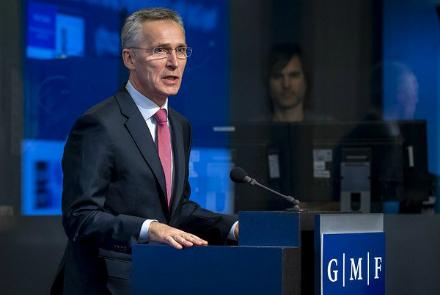NATO Defense Ministers wrapped up two days of discussions in Brussels on Thursday where the alliance’s member nations discussed issues around Russia’s violation of the Intermediate-Range Nuclear Forces (INF) Treaty, progress on burden sharing, NATO’s defense and deterrence posture, new technologies and NATO’s mission in Afghanistan.
Speaking on the conclusion of the meeting, NATO Secretary General Jens Stoltenberg said that there is a unique opportunity for peace in Afghanistan today and that the alliance strongly supports efforts for a peace deal in the near future.
“Today, NATO allies and partners reiterated their commitment to train and finance Afghan forces as they create the conditions for peace,” he said.
Stoltenberg said that allies have recently generated forces for the next rotation, and confirmed financial support for the Afghan security forces through 2024.
“We will stay in Afghanistan for as long as necessary, to ensure the country never again becomes a safe haven for international terrorists,” he said.
“While many challenges remain in Afghanistan, we now have a unique opportunity for peace. Allies fully support the efforts of US special representative ambassador Khalilzad to achieve a political settlement,” he said. “We have confirmed our financial support to the Afghan security forces to 2024,” he said.
Stoltenberg reaffirmed NATO’s support to intra-Afghan talks and said that Germany was playing a key to a role in facilitating such a meeting.
“Intra-Afghan dialogue is something which is supported by all allies and Germany plays a key role—trying to facilitate and helping to support and organize an inter-Afghan dialogue," he said. “Our best way to support the efforts to find a peace deal is to stay committed to send a very clear signal to the Taliban that they will not win on the battlefield and the good news now is that we see the Afghan forces are making progress on their own.”
“We went to Afghanistan after the terrorist attacks on the United States—9/11 2001. Because we saw that Afghanistan was a platform to train, to organize attacks on our countries and that could not continue. So we are in Afghanistan to protect our interest, our security.
He warned that the infamous Daesh military group was trying to reestablish its caliphate in Afghanistan following major setbacks it faced in Syria and Iraq.
“One of the reasons why we are in Afghanistan now and one of the things that the Afghan security forces are doing with our support, in our help and our funding is to fight Daesh is to prevent that Daesh lost caliphate in Iraq and Syria and then tried to reestablish their caliphate in Afghanistan. We must prevent that from happening," he said.
Meanwhile, Acting Defense Minister Assadullah Khalid said that he told NATO defense ministers that Taliban's spring offensive has failed.
He said that discussions were held on the needs of Afghan forces and their equipment with NATO ministers.
Khalid said that the situation is moving towards stability but it does not mean the end of violence.
He added that the Afghan forces are foiling the enemy’s threats and they have recaptured many districts and operations will move on.


Comment this post